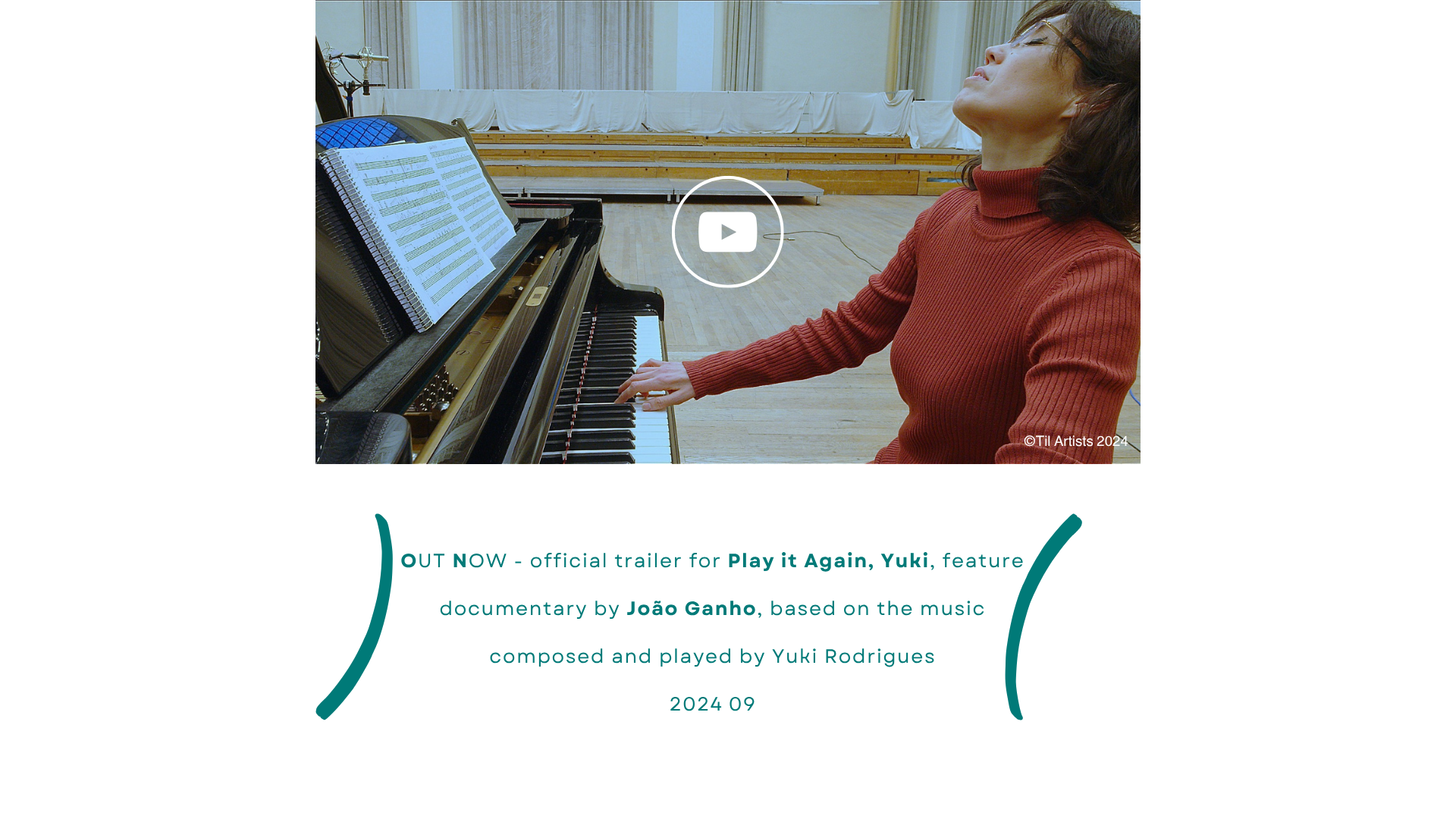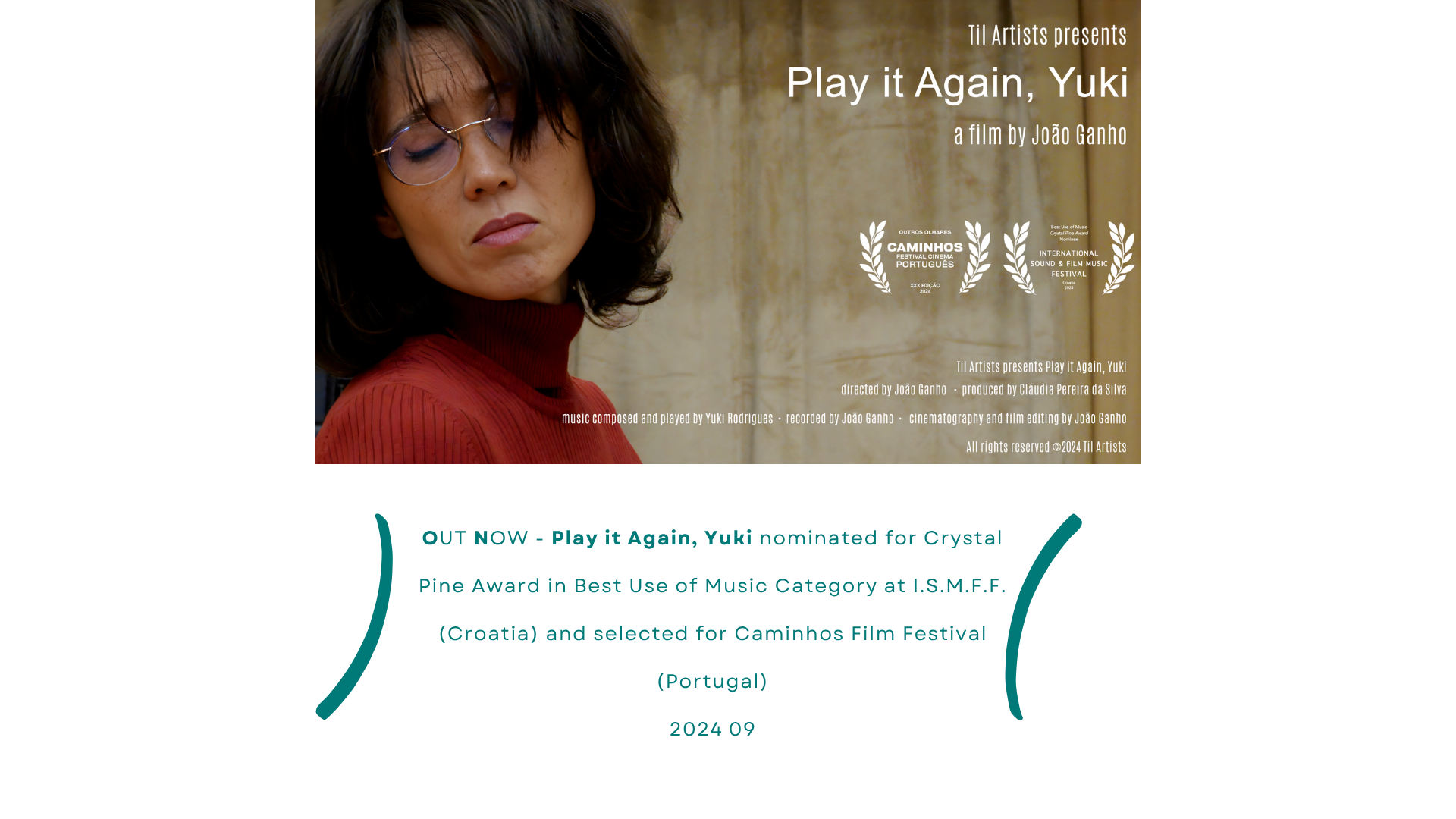
The first time I heard João Ganho's film title, Play it Again, Yuki, I went straight to one of the films that marked my life, Casablanca. One of the most emblematic scenes takes place next to the piano at Rick's Café, when Ilsa (Ingrid Bergman) asks Sam, the pianist, to play once again As Time Goes By, a hymn for my generation. "Play it, Sam" is the key line of that dialogue and takes me immediately to Play it Again, Yuki, by João. There's a dramatic story (the pianist's 18 years break from music), there's music, there's a piano, and above all there's image. Yuki's hands, expressions, emotion, it's all there. Impossible not to like it.
José Correia Guedes, O Aviador [The Aviator], 78
It was a wonderful surprise to have the privilege of seeing Play it Again, Yuki. I was amazed by the excellence of the image, of the sound, and of how I felt involved in the story. At the end, I was absolutely certain that I will be watching it again, and that this cannot turn into a hidden treasure locked up in a chest without being given the opportunity to be seen… and lived!
Teresa Loja, chief administrative officer, 56
Play it Again, Yuki is a film about life's journey, the journeys of all lives, including Yuki's life, and the obstacles that show up along the way. Stoping, moving on, restarting? Above all, willing.
The story is biographical and relatable to the lives of each one of us, dealing with the need of introspection to strive and to move on in the journey of life.
More than the story of Yuki's life episode, either somatic or not, the film is worth it for the sequences and the spaces - the church and the organ, the recording hall with the contrast between its gigantic acoustics and the triviality of the kettle and the tea - and the repeated moments of the run.
The light's truth in each still, the elegance of the chosen themes to be played by Yuki, the magnificent sound, all together make this feature a simultaneously subtle, simple and sublime work. In a world in which cinema, full of special effects, has so often lost its ability to "tell a story", Play it Again, Yuki stands out for the simplicity of what's beautiful. A masterpiece worth revisiting.
Cristina Pestana, physician, 63
Play it Again, Yuki defies the audience to listen before seeing, as sound and image find a rare balance and atmosphere where sound often assumes a central narrative role. Far from just a music documentary, or a life story, this film builds itself up as a sensitive score where the main character's piano performance and her intimate process of physical and mental conquest merge.
Recording in a concert venue instead of in a conventional studio is not just a logistical option, it is a technical and aesthetic intentional choice which brings out authenticity and texture to the audiovisual experience. The camera observes, eventually discreetly but never far; it is present in the silences, in the gazes, in the processes and in all the small movements that speak as much as the music.
The film is impressive for its formal cohesion and its technical excellence. Each frame and each sound suggest careful choosing to compose a narrative in which effort, pain and persistence emerge with great strength. It is a work that demands attention and hands back truthfulness. A film to See, Listen and reflect.
Paulo Feijão, audiovisual professional, 58
Play it Again, Yuki is a true story which combined with image and sound excellence catches us to the end, leaving us wanting more.
Daniela Sobral, physician, 53
Play it Again, Yuki is more than a documentary: it's a testimony about the power of transformation within art. And it's even more impressive because it's true cinema made without film funding - the proof that whenever there's talent and passion light will always shine bright, even in the most independent productions.
Vanessa Barata, journalist, 47
A story of tenacity, hard to live, faultlessly and effectively conveyed through an aquarelle mix of musical, human and simple and timely outdoor scenes. Congratulations to all involved in the original idea, directing, production and performance of Play it Again, Yuki, a scent of a light fragrance that leaves us with a lasting aroma.
Januário Martins, engineer, 91
A highly emotional and engaging work, through which the audience witnesses a story of pain, but also acceptance and overcoming, told in a sublime way. Loved it!
Sandra Castelão, teacher, 52
I watched and, it is deemed to say, I listened to Play it Again, Yuki in late November 2024 [XXX Caminhos Film Festival]. The intentional drifting between the pianist's spaces of transcendence, physical and other, the music that intersects the visuals and the permanent effort were to me very well transmitted by the director. The domestic details, the recording, the concert away from the limelight, the comings and goings; and the straightforward filming that delivers them granted first-class-honour to João Ganho.
Renato Almeida e Sousa, public service, 56
The sound, the image, and above all the symbiosis between them makes us believe that "where there's a will, there's a way" and that what matters is to never give up, just like Yuki did not give up. Congratulations!
Filomena Vale, 62
Play it Again, Yuki tells a story of overcoming limitations with an involvement that gets us glued to the big screen without realising the time passing, taking us to several ambiences where the film was shot, making me feel a huge empathy for the main character. In my opinion, the film stands out and makes the difference in the small details: the light, the framing, the editing, the diversity of places to where the films takes us and even Yuki herself, fragile, courageous, shaken or resilient. Going through all these stages along the film, she engages us with her suffering or with her joy. All this can only be accomplished by a great director. "Do it Again, João"!
Carla Rebelo, pharmaceutical sales representative, 56
An extremely honest film that gives the public the sense of closeness with the artist. A story of life without sugar and with a lot of class.
Lika, musician, 56
As a cinema goer, not an expert in film, I can very well say when a movie is, to me, a quality movie, and Play it Again, Yuki is excellent. From the first minutes, we are invited to listen, captured by a first person narrative that reveals an intimate journey of overcoming and resilience that, although individual, includes us all. Yuki, the main character, tells of her struggle. Her painful hands are the same that fly over the piano. Her voice resounds hope, always with a touching sobriety. Although unique, Yuki is profoundly plural: we can recognize ourselves in her.
The music is incredible, but even more surprising is the way in which it is integrated in the movie: the film editing follows the music, every theme, and the narrative is driven by the piano and not the other way round, so that the movie gets a poetic and vibrant structure - like a visual improvisation with a sonic soul.
The directing is discrete, with no fuss nor unnecessary camera movements. The sound engineer, who happens to also be the director, shows up occasionally - not to take the lead, but to remind us that everything we hear was recorded, or is being recorded, and for this we get the impression that we are there, experiencing it live. Yuki's voice, emotional, reserved, clear, reinforces the intimacy of her testimony. Play it Again, Yuki is not just a story well told, it's a musical piece played with the body in which hands and music merge. It is also a testimony of resilience that makes the subject of this film universal.
Maria do Carmo Gomes da Silva, teacher, 66
Get in touch











